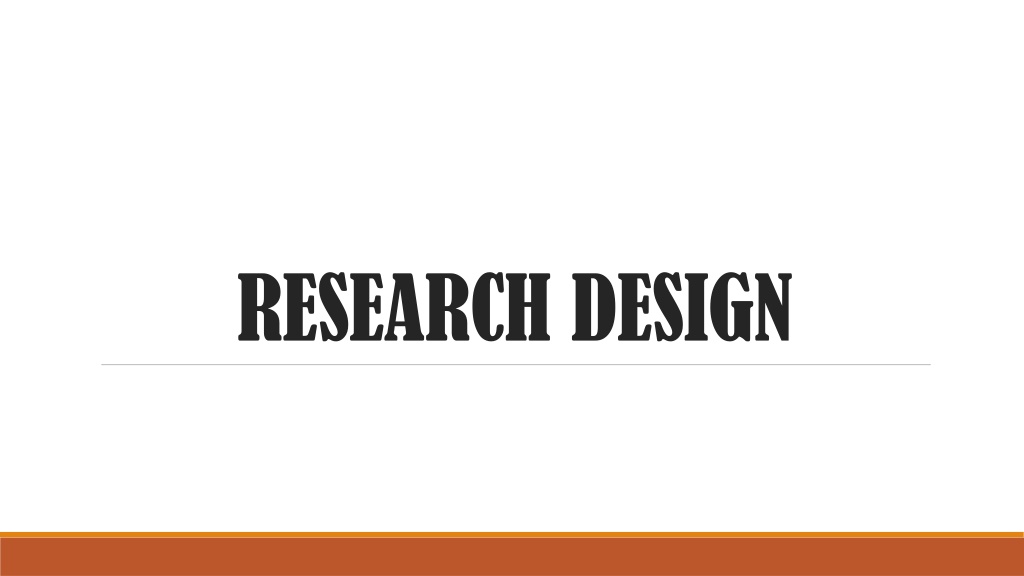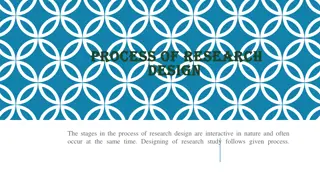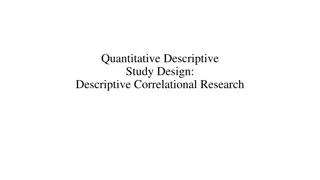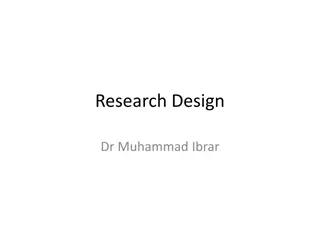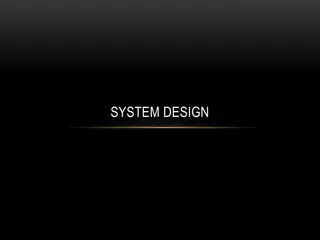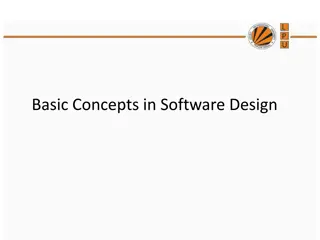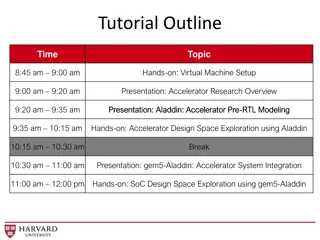Understanding Research Design: Key Concepts and Features
Research design is the blueprint that guides researchers in collecting and analyzing data, ensuring objectivity, reliability, validity, and generalizability. It involves a structured plan throughout the research process to obtain answers to research questions effectively. This article explores the definition, features, and importance of a good research design, highlighting its role in maximizing the reliability of data while minimizing biasness.
Download Presentation

Please find below an Image/Link to download the presentation.
The content on the website is provided AS IS for your information and personal use only. It may not be sold, licensed, or shared on other websites without obtaining consent from the author. Download presentation by click this link. If you encounter any issues during the download, it is possible that the publisher has removed the file from their server.
E N D
Presentation Transcript
What is Research Design ? What is Research Design ? WHEN A RESEARCH IS CARRIED-OUT, IT FOLLOWS A DEFINITE PATTERN OR PLAN OF ACTION THROUGHOUT THE PROCEDURE, I.E., SINCE THE PROBLEM IDENTIFICATION PREPARATION AND PRESENTATION. THIS DEFINITE PATTERN OR PLAN OF ACTION IS CALLED "RESEARCH DESIGN". IT IS A MAP THAT GUIDES THE RESEARCHER IN COLLECTING AND ANALYZING THE DATA. IN OTHER WORDS, RESEARCH DESIGN ACTS AS A BLUEPRINT THAT IS FOLLOWED THROUGHOUT THE RESEARCH WORK. TO THE REPORT
Definition of Research Design According to William Zikmund : "Research design is defined as a master plan specifying the methods and procedures for collection and analyzing the needed information." According to Kerlinger : "Research design is the plan, structure, and strategy of investigation conceived so as to obtain answers to research questions and to control variance". According to Green and Tull : "A research design is the specification of methods and procedures for acquiring the information needed. It is the over-all operational pattern or framework of the project that stipulates what information is to be collected from which sources by what procedures"
Features of a Good Research Design It is considered that a good research design should reduce the biasness while should maximize the reliability of data being collected and analysed. A good research design should provide the opportunity as per the various aspects of research problem. It should minimize the experimental error and should provide maximum information. Hence, it can be concluded the selection of research design relies upon the research problem and the nature of research. Following are the major features of a good research design :
1) Objectivity : Objectivity refers to the ability of the research instruments to give conclusions that are free from observer's personal biases. A good research design should be able select those instruments only that provide objective conclusions. Usually, it is believed that maintaining objectivity is pretty easy, but it proves to be difficult during execution of research and data analysis. 2) Reliability : Another essential feature of a good research design is the reliability of responses. The instruments used in research should be able to provide similar responses to a question asked from a respondent. If the response varies, the instrument is considered unreliable. In other words, reliability of research design is measured in terms of consistency in responses.
3) Validity : An important characteristic of a good research design is its ability to answer the questions in the way it was intended to. It should focus on the objective of the research and make specific arrangements or plan for achieving that objective. For example, when a research is conducted to measure the effects of advertisements in viewers, it should be able to answer this, and not the sale of a particular product. 4) Generalisability : A research design is said to be generalisable if the outcome of the research is applicable on a bigger population from which the sample is selected. Aresearch design can be made generalisable by properly defining the population properly, selecting the sample carefully, analyzing the statistical data appropriately, and by preparing it methodologically. Therefore, the more the outcomes are generalisable, more efficient is the research design.
5) Sufficient Information : Any research is conducted to gain insight of the hidden facts, figures and information. The research design should be able to provide sufficient information to the researcher so that he can analyse the research problem in a broad perspective. The research design should be able to identify the research problem and research objective. 6) Other Features : Along with the above, there are some other features also that make a research design good. These are adaptability, flexibility. efficiency, etc. A good research design should be able to minimize the errors and maximize the accuracy
Importance of Research Design Purpose of research design / Use of research designs are as follows : 1) Reduces Cost : Research design is needed to reduce the excessive costs in terms of time, money and effort by planning the research work in advance. 2) Facilitate the Smooth Scaling : In order to perform the process of scaling smoothly, an efficient research design is of utmost importance. It makes the research process effective enough to give maximum relevant outcome in an easy way.
3) Helps in Relevant Data Collection and Analysis : Research design helps the researchers in planning the methods of data collection and analysis as per the objective of research. It is also responsible for the reliable research work as it is the foundation for entire research. Lack of proper attention in preparation of research design can harm the entire research work. 4) Assists in Smooth Flow of Research Operations : Research design is necessary to give better and effective structure to the research. Since all the decisions are made in advance, therefore, research design facilitates the smooth flow of research operations and reduces the possible problems of researchers
5) Helps in Getting Reviews from Experts : Research design helps in developing an overview about the whole research process and thus assists in getting responses and reviews from different experts in that field. 6) Provides a Direction to Executives : Research design directs the researcher as well as the executives involved in the research for giving their relevant assistance.
